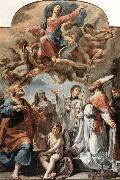Wholesale Oil Painting No Minimum |
|||||||||||
|
|
|||||||||||

|
|||||||||||
|
|
|
||||||||
Ubaldo GandolfiItalian Painter, San Matteo della Decima, 1728 - Ravenna, 1781 was an Italian painter of the late-Baroque period, mainly active in and near Bologna. He was born in San Matteo della Decima and enrolled by the age of 17 at the Clementine Academy, where he apprenticed with Ercole Graziani the Younger, Felice Torelli, and Ercole Lelli. He was from a large family of prolific artists, including his sons Giovanni Battista and Ubaldo Lorenzo, as well as his brother Gaetano and nephews Mauro, Democrito (who became a pupil of Antonio Canova), and niece Clementina. Together, they are considered the last representative of the grand manner of painting characteristic of the Bolognese school, that had risen to prominence nearly two centuries earlier with the Carracci. Gandolfi's work ranges from Baroque to Neoclassic styles, and specifically recalls the style of Ludovico Carracci. He completed, in 1770-75, a series of canvases on mythological narratives for the Palazzo Marescalchi in Bologna (two are now in Museum of North Carolina ). He died in Ravenna in 1781. |
||||||||
|
|
||||||||
Madonna in Glory and Saints
Madonna in Glory and Saints Painting ID:: 29952 |
mk67
Oil on canvas
38 1/4x26 1/8in
Uffizi,Vasari Corridor
mk67 Oil on canvas 38 1/4x26 1/8in Uffizi,Vasari Corridor |
|||||||
|
|
||||||||
|
Andrea del Sarto b.July 16, 1486, Florence d.Sept. 28, 1530, Florence Italian Andrea del Sarto Galleries Andrea del Sarto (1486 ?C 1531) was an Italian painter from Florence, whose career flourished during the High Renaissance and early-Mannerism. Though highly regarded by his contemporaries as an artist "senza errori" (i.e., faultless), he is overshadowed now by equally talented contemporaries like Raphael. Andrea fell in love with Lucrezia (del Fede), wife of a hatter named Carlo, of Recanati; the hatter dying opportunely, Andrea married her on 26 December 1512. She has come down to us in many a picture of her lover-husband, who constantly painted her as a Madonna and otherwise; even in painting other women he made them resemble Lucrezia. She was less gently handled by Giorgio Vasari, a pupil of Andrea, who describes her as faithless, jealous, and vixenish with the apprentices; her offstage character permeates Robert Browning's poem-monologue "Andrea del Sarto called the 'faultless painter'" (1855) . He dwelt in Florence throughout the memorable siege of 1529, which was soon followed by an infectious pestilence. He caught the malady, struggled against it with little or no tending from his wife, who held aloof, and he died, no one knowing much about it at the moment, on 22 January 1531, at the comparatively early age of forty-three. He was buried unceremoniously in the church of the Servites. His wife survived her husband by forty years. A number of paintings are considered to be self-portraits. One is in the National Gallery, London, an admirable half-figure, purchased in 1862. Another is at Alnwick Castle, a young man about twenty years, with his elbow on a table. Another youthful portrait is in the Uffizi Gallery, and the Pitti Palace contains more than one. Madonna in Glory and Saints c. 1528 Oil on wood, 215 175 cm |
||||||||
|
|
||||||||
|
Prev Next
|
||||||||
|
|
||||||||
|
Related Paintings to Andrea del Sarto :. |
||||||||
|
|
||||||||
|
CONTACT US |

